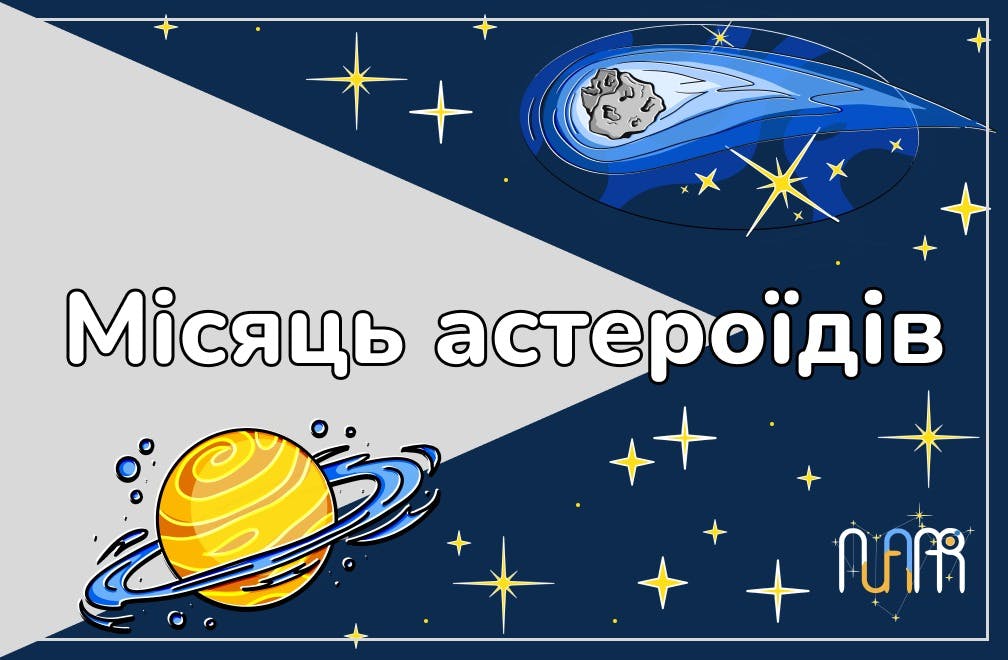Month of the Asteroids

Some figures
Start date: March 1, 2023
End date: March 31, 2023
Participants: NUAAR Wikipedia Department
Project goal and tasks
The goal is to improve the coverage of the topic of asteroids in the Ukrainian Wikipedia and catch up with the English Wikipedia in terms of asteroid topics.
Tasks:
To improve 21 articles to the Good ones.
To create 95 articles on the following topics:
Asteroids – 14 articles.
Surface features – 21 articles.
Space missions – 8 articles.
Scientists – 15 articles.
Asteroids’ families – 9 articles.
Minerals – 4 articles.
Observational programmes – 1 article-list.
Other – 23 articles.
To improve 136 articles via translation:
Asteroids – 92 articles.
Space missions – 9 articles.
Scientists – 6 articles.
Other – 29 articles.
Tasks № 2b, 2d-2f – completed, № 2a, 2c, 2h and 3 – partially completed, № 2g – uncompleted.
Key organisers and project executors
Organiser: Oleksiy Golubov.
Executors: NUAAR Wikipedia Department.
Project outcomes
Since there are a lot of results for specific categories, they are presented in the form of tables.
Created articles:
Improved articles:
Also, the article «Potentially hazardous object» received the status of Good article, and the article about the asteroid «4 Vesta» received the quality of Good article and then was submitted to the Featured and received this status.
Cool facts
The article «Potentially hazardous object» was not initially planned to be submitted to Good one at all. However, in the process of addition, much information was added by translation from the English Wikipedia, and the article's author also mentioned the presence of many films and even computer simulation games on this kind of topic.
The «4 Vesta» article was also not originally planned to be submitted to Featured. However, the article was high quality, and the Wikipedia community submitted it to Featured immediately after granting the Good status. Thus, this article became the first and, as of mid-October, the only article for 2023 that received the status of Featured in the Ukrainian Wikipedia.
Project conclusions
From the point of view of the sheer number of articles created, this project has become the most successful of all our team has conducted.
In total, 105 astronomical articles were created and revised during March.
Suppose one calculates such an indicator as a work activity. In that case, one needs to divide the number of created and improved articles by a time. For the first three Wikipedia projects, it has the following values:
Month of the Asteroids – 24 articles/week;
Polish Astronomy Fortnightly – 33 articles/week;
Variable Stars Week – 29 articles per week.
Message from the CEO of NUAAR
The third Wikipedia project started after a two-week break for the Wikipedia team to rest. The plan this time was even more ambitious than during the "Fortnightly" – a total of 252 articles. However, the deadline was no longer two weeks but almost 4.5. Accordingly, the plan was expected to be completed by approximately 50% if we worked as actively. At that time, the Wikipedia Department was at the peak of the number of people – it had a maximum of 18 participants. In reality, the results were significantly lower, about 42% if one looks at the numbers. Personally, I do not have a clear assessment of this project. However, this does not mean that the project was a failure, unsuccessful, or only partially successful.
First of all, one's strength was again overestimated because writing 21 Good articles in a month is, to put it mildly, impossible. This fact is more than currently Good articles on astronomy and cosmonautics in the Ukrainian Wikipedia. Also, the number of articles in other categories could have been overestimated relative to the actual capabilities of the team. Moreover, we have 105 created articles and that’s fine.
Secondly, it was possible to complete part of the article creation project by almost 97%, which is already a good indicator of success. Also, consider that creating an article requires approximately 1.5-2 times more effort to finish a similar article. Therefore, according to the volume of work, these 42% correspond to approximately 55% of the planned.
Thirdly, much more was achieved than planned in some directions. Receiving the status of Featured in the article "4 Vesta" was very unexpected. Considering that for 2023, this is the only Featured article so far, and it will probably remain so until the end of this year, this project might be considered a success.
Therefore, from a tactical point of view, it can be called successful in general. However, from a strategic point of view, everything was much worse. As mentioned above, at that time, there were 18 people in the Wikipedia Department. Furthermore, this, for a second, is more than in all other departments combined. However, quantity does not equal quality, and this is where the problems begin. About 2/3 of the Wikipedia Department was down. It had people who had yet to have a single edit in over three months.
It was the last successful project of the first Wikipedia Department. Then, there was an attempt to launch several more projects (sometimes simultaneously and chaotically), but they were never completed. Full-fledged training in the department was also not carried out, although some attempts were made. The Wikipedia part of the NUAAR team gradually began to lose motivation. Already in June and July, the department completely ceased to function. At the end of July, at a general team meeting, it was decided to disband this Wikipedia department and create a new one from scratch in terms of personnel, management methods, and priorities. As a result, only 3 participants from the previous department remained, who moved to the new one.
This fact is a sad chapter in the history of NUAAR, but we hope that the current Wikipedia Department will be much more efficient than the previous one and will consider all its mistakes. Moreover, we will do everything possible for this.
Related projects
Variable Stars Week
Fortnightly Polish Astronomy
